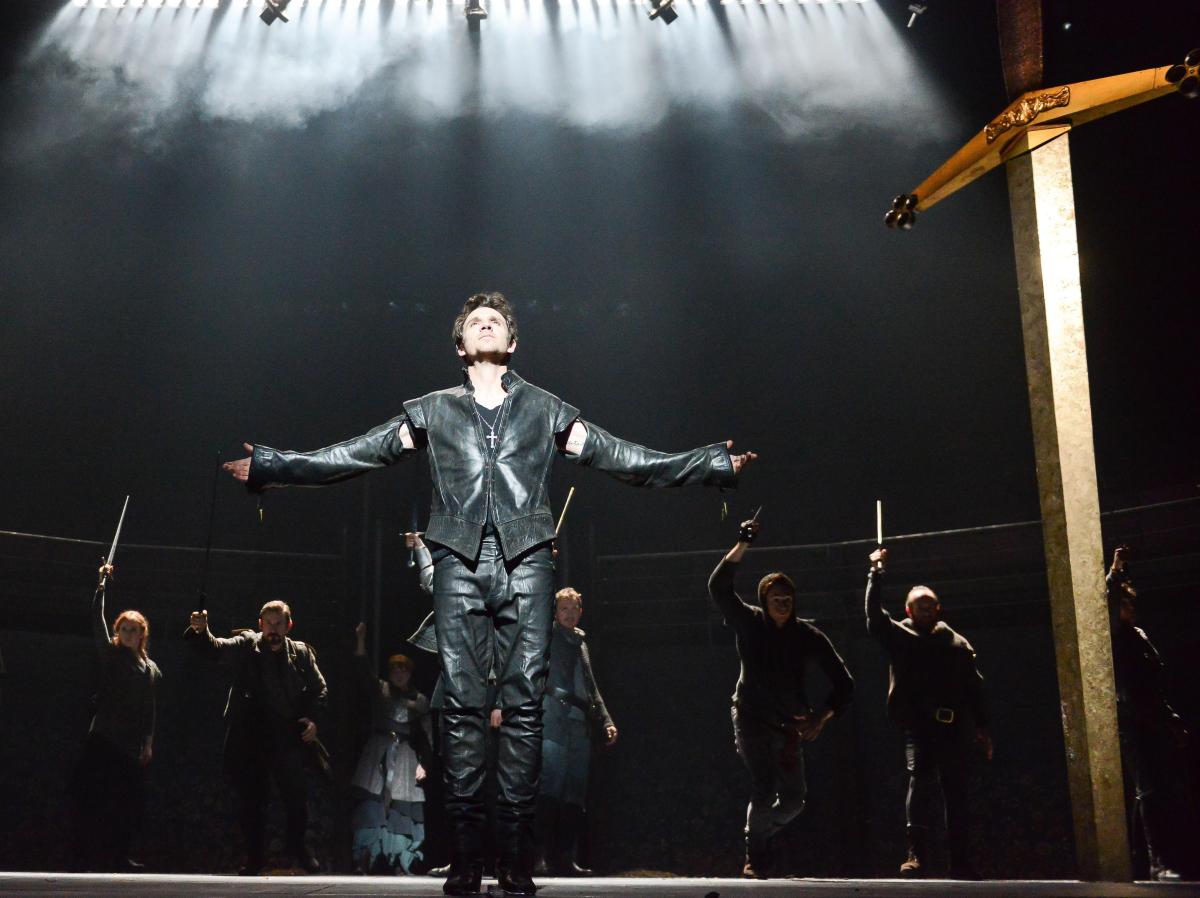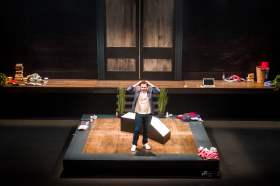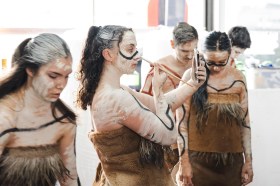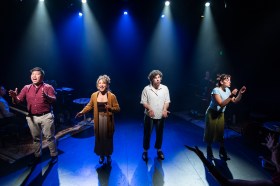Photo credit: Robert Day, Adelaide Festival of Arts
Rona Munro’s The James Plays were originally staged at the Edinburgh International Festival in August 2014, only weeks before Scotland voted on its independence from Great Britain. In her author’s note for the re-staged history cycle at this year’s Adelaide Festival of Arts, Munro notes: ‘These are stories, epic stories, and, hopefully, they are entertainment. However, they are set within a period of Scottish history that is virtually unknown.’
As the National Theatre of Scotland’s Artistic Director, Laurie Sansom recently told ArtsHub: ‘[Rona] kind of looked at the brilliant stories about these early Tudor kings and thought, well, if she can provide Scotland with its own history cycle then perhaps these stories will become part of the Scottish DNA.’
Munro certainly has great material to work with for her dramatisation of the lives and reigns of of James I, James II and James III of Scotland: a prisoner turned poet; a nightmare-haunted boy-king; and an impetuous, impulsive dandy whose passions threaten to bankrupt his kingdom.
Performed by a suitably epic cast of 20, the action plays out on a relatively small stage, ringed about with additional seating and evoking the feel of an amphitheatre in which blood will be spilled for our amusement. A giant claidheamh-mòr stabs down into the set, symbolic of the slaughter to come. Above the stage as the first play begins, central and spotlit: the throne – the baleful goal inspiring the impending tumult.
In James I: The Key Will Keep the Lock, we meet young James Stewart (Steven Miller) – the uncrowned king of Scotland, who has languished 18 years in England as a prisoner of Henry IV (Matthew Pidgeon). In comparison to the rough and ready Henry, who describes the duties of a king as having to ‘fuck women you don’t know and kill your relatives,’ James is compassionate and intelligent: he writes poetry, and empathises with the commoners whose fields are trampled in the nobility’s wars.
Sent north by the dying Henry in order to claim the throne and his ransom, which he must send south to England, James faces suspicious and rebellious Scottish nobles and an arranged marriage with an English noblewoman, Joan Beaufort (Rosemary Boyle).
Despite a lack of narrative complexity, James I is easily the best of the trilogy; performances are strong – especially John Stahl as the Scottish Regent, Murdac Stewart, and Blythe Duff as Murdac’s power-hungry wife, Isabella – and the dramatic arc plays out cleanly and compellingly. The warm yet nervous ‘first date’ small-talk between James and Joan at their wedding is a highlight, though it is soon followed by a shocking moment of barbarism at the end of the first act, which reminds us that for all the play’s contemporary pace and staging, its events depict a medieval sensibility.
Later scenes of warfare are contrasted somewhat predictably with Queen Joan’s labour, though the intercutting of armed combat and childbirth successfully reminds us of the risks adults faced in the period and the challenges of establishing a dynasty.
Ruthlessness, power plays and savagery unfold more tragically in James II: Day of the Innocents. Following his father’s murder, the boy-king James II (Daniel Cahill), his face disfigured with a large birthmark, becomes – at least initially – the unwitting tool of an unpleasant series of noblemen, including the avaricious Earl Livingstone (John Stahl) and the ambitious Balvenie Douglas (Peter Forbes).
Tortured by flashbacks and nightmares, James relies on his boyhood friend William Douglas (Andrew Still) for support – but when Will realises he is losing James to Queen Mary, their friendship quickly sours. Too quickly, it feels: stronger scripting is required to render the descent of the men’s once tender relationship into violence and recrimination, convincing.
Finally, in James III: The True Mirror, the focus shifts refreshingly from the men of these histories to the women – and one woman in particular, the intelligent, compassionate and powerful Margaret, Queen of Scots (Malin Crépin). With the King (Matthew Pidgeon) squandering his wealth on new obsessions, increasingly younger companions, and a choir who are paid to serenade him wherever he goes, it is Margaret who must prevent the kingdom from falling into poverty and war – even as she battles with her feelings for John (Ali Craig), the increasingly antagonistic head of her husband’s Privy Council.
Anachronistic flourishes (including minstrels playing The Human League’s ‘Don’t You Want Me’, and more contemporary costuming) reflect the shift from the Medieval into the Renaissance, and comedy is used effectively to counterpoint the drama – with special credit to Blythe Duff as the King’s no-nonsense aunt Annabella. But the play’s self-conscious Scottish pride, embodied by Margaret’s closing speech in the play’s final act, feels forced, and her exhortations to the audience – which may have thrilled in Edinburgh – do not resonate. The play as a whole feels a trifle unfocused and dramatically unsatisfying, with the central motif of a mirror – at the time a new advancement in glass-making which shows people as they really are, rather than as they imagine themselves to be – underutilised.
Easily digestible and a towering undertaking – full credit to the tireless cast and teeming backstage army whose labours dwarf the audience’s own feat of comfortably-seated endurance – The James Plays are superb entertainment, and like binge-watching Game of Thrones, experiencing all three of the plays in one day is exhausting and exhilarating in equal measure. But as with much contemporary television, the thrill is in the moment, not the remembering.
Rating: 3 ½ stars out of 5
The James Plays
A National Theatre of Scotland, National Theatre of Great Britain and Edinburgh International Festival co-production
By Rona Munro
Directed by Laurie Sansom
Festival Theatre, Adelaide Festival Centre
26 February – 1 March 2016
Adelaide Festival of Arts
26 February – 14 March 2016
www.adelaidefestival.com.au
Richard Watts travelled to Adelaide as a guest of the Adelaide Festival of Arts.





